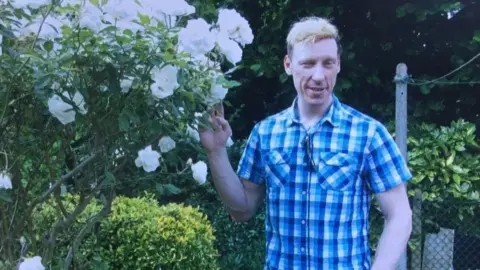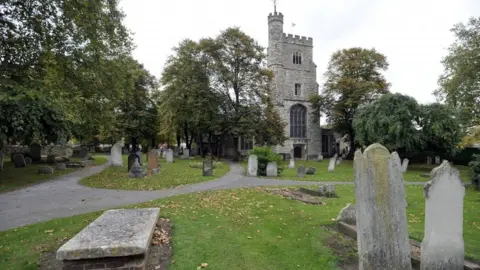Stephen Port: Detective believed first victim had been murdered
 Family handout
Family handoutA detective investigating the circumstances of serial killer Stephen Port's first homicide felt that the case was likely to be one of murder and told senior officers of his concerns.
Anthony Walgate, 23, was found dead outside Port's flat block in June 2014.
Det Ch Insp Tony Kirk tried to establish a murder inquiry, an email shown to an inquest jury revealed.
Port would go on to murder three more men using the date rape drug GHB before homicide detectives took on the case.
The inquest jury at Barking Town Hall also heard evidence from Det Ch Insp Christopher Jones, the senior murder detective involved in the case in the week after the death.
Det Ch Insp Jones told the hearing it was "not possible" that detectives would have taken the case less seriously because Mr Walgate was "young, gay and working as an escort".
The jury, which is examining the Metropolitan Police's handling of the investigation, heard Det Ch Insp Kirk's email was sent a week after Mr Walgate's body was found outside Port's flat in Cooke Street in Barking, east London.
It set out that it was known to the force that Port, now 46, had lied to officers about not knowing Mr Walgate, who he had in fact arranged to meet two days before the killing.
A post-mortem examination found that the 23-year-old died as a result of ingesting high levels of the date rape drug GHB.
The jury heard how Det Ch Insp Kirk pointed out in his email that Port had previously had an allegation made against him that he had drugged and raped another man, and had no means of paying the £800 Mr Walgate charged for his work as an escort - which was how the two men came to meet each other.

In the message, to Supt John Sweeney of Homicide Command, Det Ch Insp Kirk said: "I feel we as an organisation have a duty to his (Mr Walgate's) friends and family to get to the bottom of his death in what are increasingly suspicious circumstances.
"This investigation concerns the death of a young and what appears to be a fit and healthy male and, on the balance of probabilities, at the hands of another.
"I appreciate that a murder charge might not be the final outcome, but the investigation is becoming increasingly complex."
Supt Sweeney decided to leave the investigation with the less experienced detectives in the Barking borough command, the inquest heard.
Jurors were also told that detectives did not then carry out a vital download of Port's laptop requested by the homicide team.
The laptop, which had been seized by police, contained evidence of him using search terms to do with drugging and raping boys, the inquest heard.
The paramedic who found Mr Walgate's body previously told the jury he had regarded it as an "unexplained suspicious death".
 PA Media
PA MediaSpeaking on Monday, Det Ch Insp Jones explained that in his opinion at the time, the death was unexplained - but he said he had not been told the post-mortem examination had found bruises suggesting Mr Walgate had been moved while he was still alive.
Nor had he been told that dead man's underpants were inside out and back to front, the jury heard.
Port's next two victims, Gabriel Kovari, 22, and Daniel Whitworth, 21, were found dead by the same dog-walker three weeks apart beneath a large maple tree in a corner of the same cemetery, at St Margaret's Church.
Mr Kovari's body was found on 28 August 2014 and Mr Whitworth's was discovered on 20 September, in almost exactly the same spot.
The final victim, aspiring police officer Jack Taylor, 25, was found near the cemetery on 14 September 2015.
In 2016, Port was found guilty at the Old Bailey of the four murders and sentenced to a whole-life order.
The inquest hearing continues.
